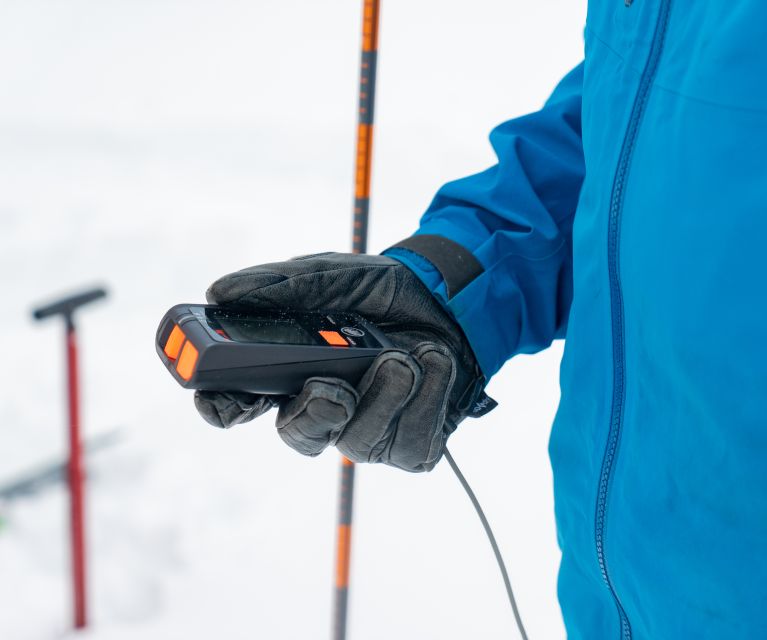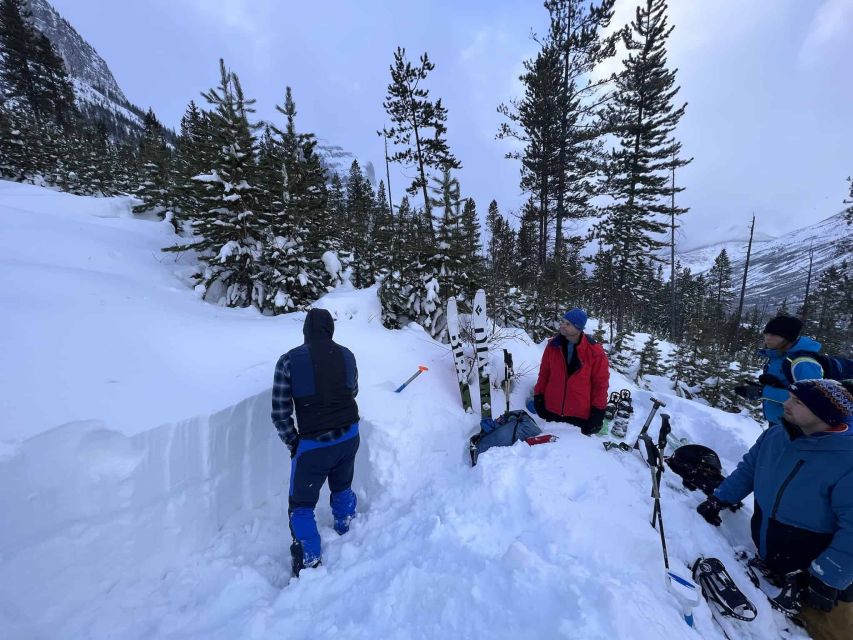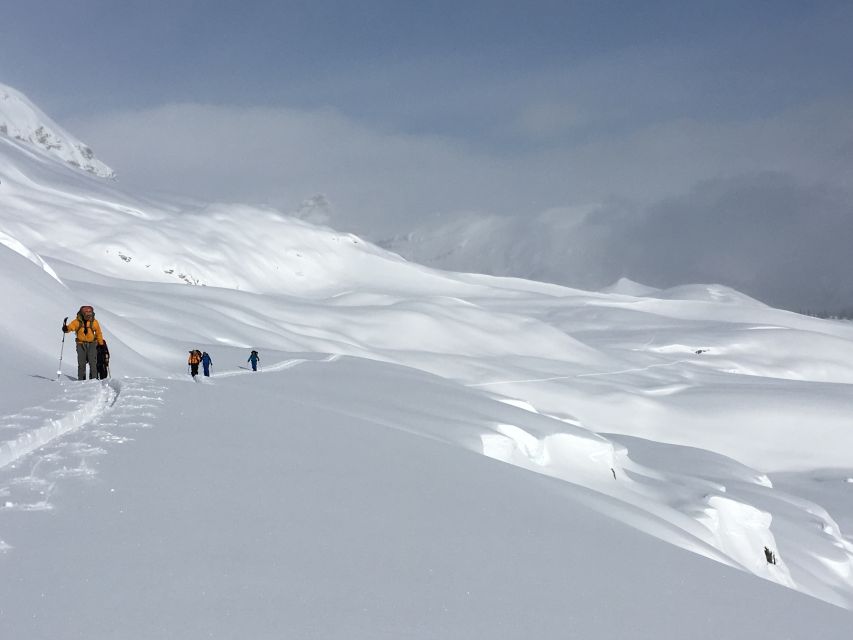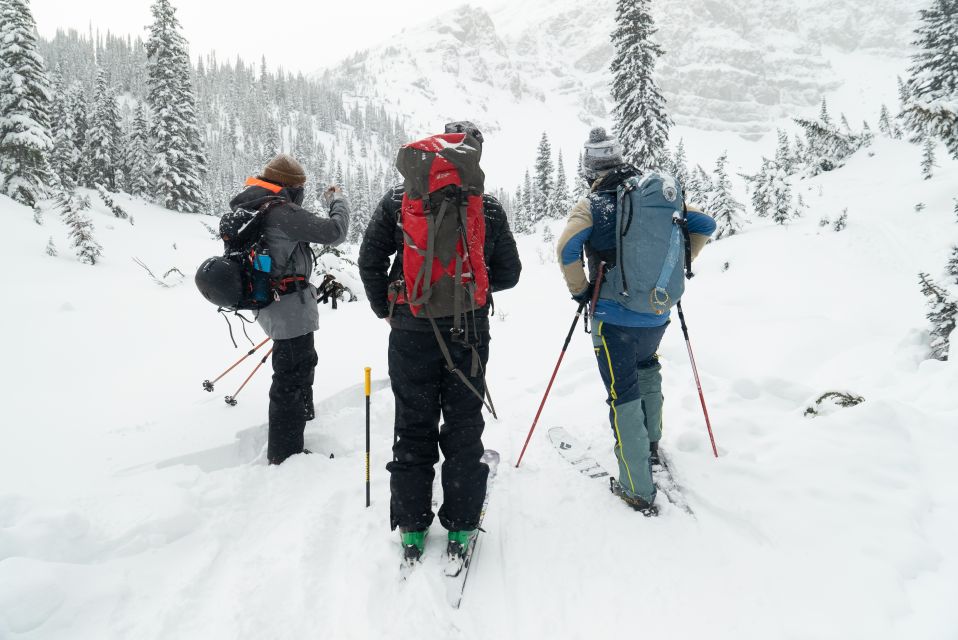With an average of 1500 avalanche incidents reported worldwide each year, understanding the fundamental principles of avalanche safety becomes paramount for all backcountry adventurers. The AST 1 course offers a structured approach to acquiring crucial skills that could potentially save lives in the event of an avalanche.
Starting from the basics and gradually progressing to advanced techniques, participants are equipped with the knowledge and tools needed to make informed decisions in avalanche terrain. Join the discussion to uncover how this course can benefit both beginners and experienced outdoor enthusiasts seeking to enhance their avalanche awareness and preparedness.
Key Points

- AST 1 equips participants with essential avalanche safety knowledge and practical skills.
- Participants learn snowpack analyses and weak layer recognition for accurate risk assessment.
- Safety equipment is included to ensure a safe learning experience.
- The course provides comprehensive inclusions, fieldwork, and simulations for a well-rounded learning experience.
Course Overview

Avalanche Skills Training Level 1 (AST 1) provides participants with essential knowledge and practical skills to navigate avalanche terrain safely and effectively. The course offers an in-depth overview of mountain conditions and weather patterns that cause avalanches. Participants learn crucial safety techniques to avoid and manage avalanche scenarios.
They also gain vital survival skills and engage in companion rescue simulations to enhance their preparedness. The course includes detailed discussions on snowpack analyses and weak layer recognition, equipping individuals with the ability to assess avalanche risks accurately.
You can also read our reviews of more tours and experiences in British Columbia.
Inclusions and Equipment

Participants in Avalanche Skills Training Level 1 (AST 1) benefit from a comprehensive package of inclusions and equipment essential for their safety and learning experience. The course provides the Avalanche Canada AvCan curriculum with AvCan text and The Avaluator. Safety equipment such as an avalanche transceiver, shovel, and probe are also included. Plus, participants learn under the guidance of ACMG/IFMGA-certified ski and mountain guides and CAA-certified instructors. Upon completion, individuals receive an AvCan certificate. Below is a table summarizing the inclusions and safety equipment provided in the AST 1 course:
| Inclusions | Safety Equipment | Guides |
|---|---|---|
| AvCan curriculum with AvCan text and The Avaluator | Avalanche transceiver | ACMG/IFMGA-certified ski and mountain guides |
| CAA-certified instructors | Shovel | |
| AvCan certificate of completion | Probe |
Activities and Schedule

Engage in a range of hands-on activities and educational sessions throughout the two-day Avalanche Skills Training Level 1 (AST 1) course to enhance your understanding of avalanche safety and survival techniques.
The course includes a field day at Banff National Park, where you will practice simulated companion rescues, snowpack analyses, and weak layer recognition.
Plus, classroom sessions on Zoom will complement the practical learning experiences. These simulation exercises are designed to immerse students in realistic avalanche scenarios, preparing them for potential real-life situations.
By actively participating in these activities, you can develop the necessary skills and knowledge to navigate safely in avalanche terrain.
The combination of fieldwork and theoretical sessions ensures a comprehensive learning experience during the AST 1 course.
Logistics and Booking
Enjoy the practical aspects of Avalanche Skills Training Level 1 by exploring the logistics and booking details for this comprehensive course.
To secure your spot, reservations can be made with a flexible free cancellation policy up to 24 hours before the course. Payment options allow you to reserve now and pay later, making it convenient to plan ahead.
Keep in mind that accommodation, transportation, and food aren’t included, but rental options for personal ski touring/splitboard equipment are available.
On the field day, there will be a maximum of 8 students per instructor, ensuring a personalized learning experience.
Prepare to explore the world of avalanche safety with AST 1.
Important Information for Participants
Before embarking on the Avalanche Skills Training Level 1 course, ensure you’re equipped with appropriate snow clothing and winter sports gear for a safe and immersive learning experience.
- What to bring:
- Snow pants and jacket
- Insulated waterproof gloves
- Warm hat or beanie
- Ski or snowboard boots
- Goggles with good visibility
Participants must have these essential items to stay warm, dry, and comfortable during the course. Plus, having the right gear enhances safety and aids in practical learning. Inadequate clothing or equipment could impact the overall experience and limit participation in certain activities. Remember, preparation is key to making the most of your AST 1 training.
Common questions
Can Participants Bring Their Own Avalanche Safety Equipment or Is It Mandatory to Use the Equipment Provided?
Participants can bring their own avalanche safety equipment, but it is mandatory to use the gear provided. Fitness requirements and age restrictions apply. It’s crucial for everyone’s safety that all participants comply with the necessary safety protocols.
Are There Any Physical Fitness Requirements or Recommendations for Participants Taking the AST 1 Course?
Physical fitness is essential for AST 1 participants to navigate mountain terrain safely. Recommended equipment includes snow clothing and winter sports gear. Bringing personal ski touring/splitboard equipment is optional, while avalanche safety gear is provided.
Is There a Minimum Age Requirement for Participants Enrolling in the AST 1 Course?
For participants enrolling in the course, there is a minimum age requirement. They must be at least 16 years old. Safety equipment, including avalanche transceiver, shovel, and probe, is provided, ensuring preparedness for all scenarios.
Are There Any Additional Costs or Fees That Participants Should Be Aware of Outside of the Course Price?
When looking to join the course, participants should note that additional costs for gear rental and transportation may apply. However, accommodation, food, and personal ski touring/splitboard equipment rentals are not included in the course price.
What Is the Instructor-To-Student Ratio for the Classroom Session on Zoom?
In the Zoom session, the instructor-to-student ratio is capped at 1:8 to ensure personalized attention and effective learning. Participants can specify equipment preferences, and while no specific fitness requirements are mentioned, being in good physical condition is beneficial.
Final Words
To sum it up, the AST 1 course offers outdoor enthusiasts a valuable opportunity to develop essential avalanche safety skills in an engaging and practical setting. With certified guides leading the way, participants learn crucial techniques like companion rescue and snowpack analysis to navigate avalanche terrain with confidence.
From understanding mountain conditions to hands-on activities, this course equips individuals with the knowledge and tools needed to stay safe in the backcountry. Don’t miss out on the chance to enhance your avalanche awareness and preparedness!
More Tour Reviews in British Columbia
Not for you? Here's more nearby things to do in British Columbia we have reviewed
- Vancouver Whale Watching Safari
- Yoho National Park: Cross Country Ski at Emerald Lake
- Golden, BC: Kicking Horse River Family Rafting With Lunch
- Clearwater County: Canadian Rockies Scenic Helicopter Tour
- Freshfields/Lambe Glacier: Ski Basecamp
- From Banff or Lake Louise: Moraine Lake & Larch Valley Hike
- Golden, BC: Kicking Horse River Half Day Whitewater Rafting
- Heli Adrenaline Canyoning Tours
- Clearwater, British Columbia 1/2 Day Rafting (Ready Set Go)!
- Backcountry Ski: Powder Warrior, February
- Calgary Airport Transfer To/From Canmore, Banff, Lake Louise
- Daily SUP Paddleboard Rentals Package in Metro Vancouver
